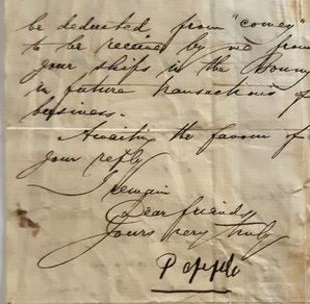
William Dappa Pepple was the king of Bonny, between 1835 and 1866, who called the Christian faith in 1864 to Bonny, thereby pioneering the Niger Delta pastorate of the Anglican Church. Born in 1817 in a long lineage of Bonny kings, in a dynasty that was started in the late 17th Century by Perekule, a rich trader with large amount of arms, whose name, in James Barbot’s 1699 account was given as “Pepprell”. William Dappa Pepple rose to the throne of Bonny when the people resisted the leadership of regents from the two ruling houses, Anna and Manilla Pepple whose rise to power was occasioned by the deposition of Pepple IV.
Dappa Pepple made alliance with the British who had shortly before his coronation taken interest in the internal affairs of the coastal states of Nigeria, with the aim of abolishing trans-Atlantic slave trade. Pepple, needing to affirm his authority in the face of his powerful Bonny subjects who opposed him, agreed to end slave trade, on a term which the British repeatedly failed to keep. Dappa Pepple was in the midst of these, very rich that, in the missionary, Hope Wadell’s words, “accumulated much, which he did not know what to do with.” Being a relatively modest man of temperate bearing, Pepple’s most apparent aspiration was the promotion of Bonny’s trade, a passion which drew him into a crisis with Elem Kalabari neighboring kingdom- The British authority, displeased by Pepple’s demonstration of absolute confidence, trickily deposed him in 1854. At Fernando Po, where he was held prisoner, Pepple made acquaintance of William Baike, the man by whose genius, the Southern Nigeria protectorate was fashioned. Pepple was later taken from Fernando Po to Ascension Island, and finally to London, where he was baptized into the Church of England, and developed his faith in the doctrines of Christ, which he came to believe, was instrumental to the prosperity of England.
In 1855, the man who had replaced Pepple in his Bonny court died from inflammation of the chest. His death, believed to have been plotted by rival ruling house, caused a civil war that ended in the death of about 300 of Dappa Pepple’s supporters. The war between the Manilla Pepple house and the Anna Pepple morally empowered the British to interfere, and haven seen Dappa Pepple’s deposition had not served their purpose, decided that he be returned as king.
In 1861, Dappa Pepple was paid a huge pension and told he could return to Bonny. From London, he convened a convoy of artisans, pastor, and professionals who he believed would help him bring English wisdom to his Bonny home. Although his convoy deserted him on realizing Africa’s true condition, Pepple’s appeal to the Bishop of London in 1864 was replied with the dispatch of Ajayi Crowther, who, a week before the arrival of the letter had been consecrated the first African bishop. The big bell used by Pepple’s father to worship Bonny gods, he now used to call the faithful to church. Dappa Pepple’s latter days were spent in relative obscurity as younger men like Jaja, who was to become king of Opobo, and Niger Delta’s most important figure of his day, became prominent, first as leader of the Anna Pepple house. In 1865, Pepple retired to a smaller town, worn out by the troubles of his changing kingdom and his inability to wrestle against the forces of time. He died in 1866 shortly after laying foundation for a chapel in Orupiri.
Dappa Pepple was a tall, intelligent looking man, with a pair of eyes which often gave him away as cunning. He spoke English fairly well, and showed detailed knowledge of European politics of his day, once calling to mind, the treatment of Napoleon of France in the hands of the British, in comparison with his own exile.





















